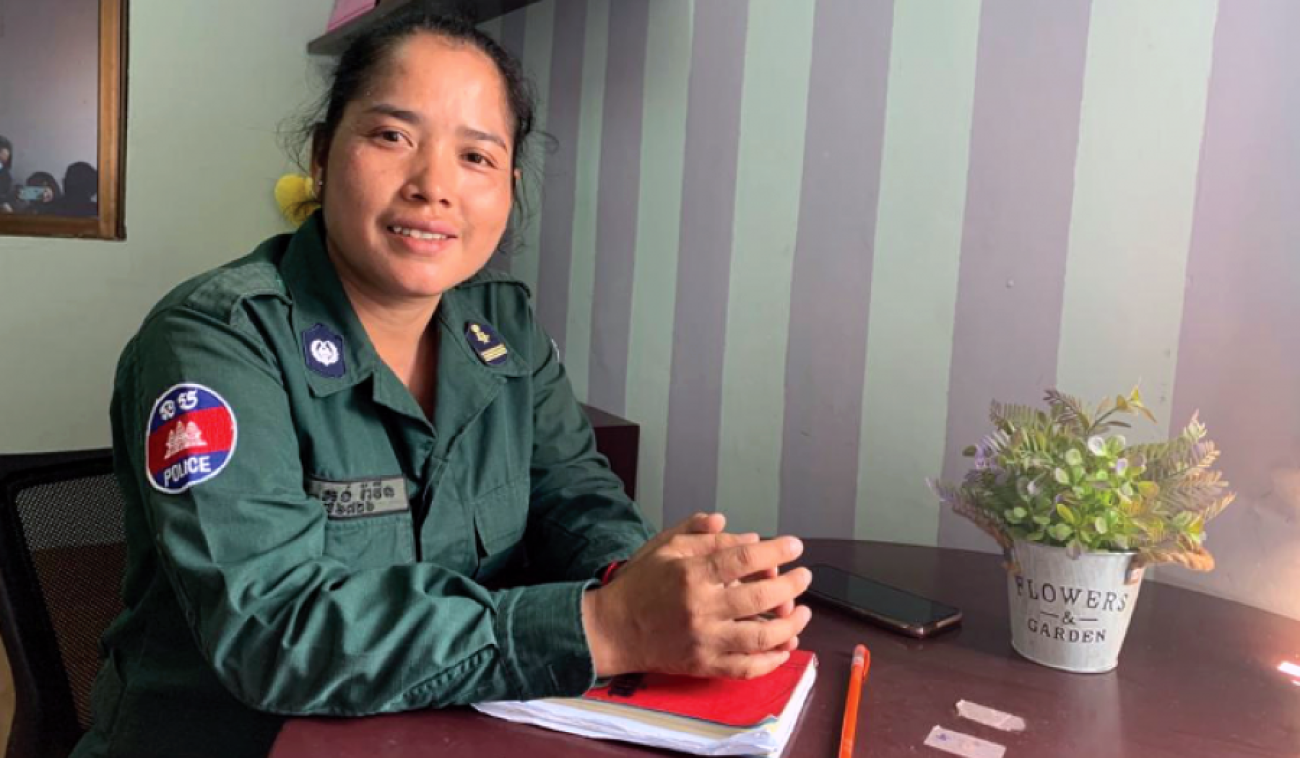On duty in Cambodia: A police officer helps survivors of gender-based violence, pandemic or no

Kong Ravin is Deputy Chief of Unit of the Anti-Human Trafficking and Juvenile Protection Office, Police Commissariat of Kandal Province in Cambodia. She took a training organized by the UN Joint Programme’s project “Safe and Fair” on protecting the rights and opportunities of women migrant workers in Southeast Asia.
I’ve been serving the community as a judicial police officer for six years. I love working in the field, fighting crime and supporting survivors, especially women and girls who have experienced abuse or rape. All female police officers play a critical role in arresting perpetrators and bringing justice to the survivors. There should be more female police officers.
If there were no pandemic, my daily routine might involve supporting survivors of human trafficking, or transferring survivors to shelters, or filing a case of domestic violence.
But like other officers, a new task has been added to my routine: patrolling the quarantine centres and making sure people are following the rules.
Lots of women migrant workers stayed in the quarantine centres, those who used to work and live in other countries. They share some experiences in common and they want to chat, mostly about how they are worried about their families and kids. But rules are rules, and it is my job to make sure social distancing is in place at the quarantine centre.
When COVID-19 started, I was very scared and had no clue on what I should do. I was concerned about my family. I even asked my mother not to go to the hospital to get her regular prescription. I did not want to go out of my house and wanted to stay at home with my family.
However, it is my duty to protect everyone not just from the virus but also from the violence that could still occur during the pandemic. As long as there is someone who needs my help, I’ll give them a hand, no matter what virus is loose in the world.
I recall, there was a case of a Cambodian woman who migrated to China for work. But once she arrived at the airport she was “sold” as a bride—something she never agreed to or was informed of—and her passport was taken away from her. Worst of all, she was trapped in the house and exposed to the abusive behaviour of her “husband.” It was lucky for her that her family could contact the police for help and we got involved. Unfortunately, she is not the only one who has gone through this kind of situation.
It is good to migrate. It is a person’s right to make that decision. It takes courage to be a woman migrant worker. We all have our roles in ending violence against women migrant workers.
Women who are thinking about migrating for work, please triple-check if the route you plan to take is safe, and that you are fully aware of the regulations and conditions in the place where you are going.
Police officers like me, it is our duty to protect them and to equip ourselves with the most up-to-date knowledge on how to get support them.
And for all community members, we should not judge or discriminate against women migrant workers. They migrate for work so they should be called heroes of their families.
“Safe and Fair” is a project of the UN Joint Programme to protect the rights and opportunities of women migrant workers in countries in the Association of Southeast Asian Nations (ASEAN). “Safe and Fair” is a partnership of the International Labour Organization (ILO) and UN Women, in collaboration with the UNODC, and is part of the Spotlight Initiative, a global, multi-year initiative between the European Union (EU) and the United Nations (UN) to eliminate violence against women and girls.
Produced by UN Cambodia. Written by Sophea Khun, Cambodia Office oic, UN Women and Younghwa Choi, Safe and Fair Regional Programme Support, UN Women. This is an edited version of the originally published article. Edited by Paul VanDeCarr, Development Coordination Office. To learn more about the work taking place in the country, visit: https://cambodia.un.org/.





































